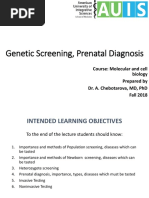Common Tests
Common Tests
Uploaded by
api-84383303Copyright:
Available Formats
Common Tests
Common Tests
Uploaded by
api-84383303Original Title
Copyright
Available Formats
Share this document
Did you find this document useful?
Is this content inappropriate?
Copyright:
Available Formats
Common Tests
Common Tests
Uploaded by
api-84383303Copyright:
Available Formats
Common Tests during pregnancy
The Triple or Quad Screen Test
Looks for 3 specific things:
Alpha-fetoprotein , or AFP, a protein that the fetus produces Human chorionic gonadotropin, or hCG, a hormone produced by the placenta Estriol, an estrogen hormone produced by both the fetus and placenta The test can additionally measure levels of inhibin-A, a protein produced by the placenta and ovaries. If this test is added to the Triple screen, it is called a quad screen. Inhibin A is more specific in detecting Downs Syndrome. These test measure levels of AFP, hCG and estriol. The results are analyzed along with the mother's age, weight, ethnicity and stage of pregnancy in order to assess risk of genetic disorders.
http://www.americanpregnancy.org
Common Tests during pregnancy
The Triple or Quad Screen Test
High levels of AFP may suggest that the developing baby has a neural tube defect such as spina bifida or anencephaly. However, the most common reason for elevated AFP levels is inaccurate dating of the pregnancy. Low levels of AFP and abnormal levels of hCG and estriol may indicate that the developing baby has Trisomy 21( Down syndrome), Trisomy 18 (Edwards Syndrome) or another type of chromosome abnormality.
The primary reason for conducting the test is to screen for genetic disorders.
When is the triple screen test performed?
Between the 15th and 20th week of pregnancy . The test involves drawing maternal blood.
http://www.americanpregnancy.org
Common Tests during pregnancy
The Triple or Quad Screen Test
Who should take this test?
All pregnant women should be offered the triple screen, but it is specifically recommended for women in these groups:
Have a family history of birth defects
Are 35 years or older
Have used possible harmful medications, drugs or alcohol during pregnancy
Have DM, especially those who use insulin
Had or been exposed to a viral infection during pregnancy.
Have been exposed to high levels of radiation
http://www.americanpregnancy.org
Common Tests during pregnancy
Chorionic Villus Sampling
Chorionic villus sampling is a test for identifying chromosome abnormalities and other inherited disorders. It is recommended for women with a history, or whos partner has a history, of genetic defects or inherited disorders.
When is chorionic villus sampling performed?
CVS is usually performed between 10 and 13 weeks from your last menstrual period, and may be chosen over amniocentesis because it may be performed earlier in the pregnancy.
How is chorionic villus sampling performed?
CVS involves removing some chorionic villi cells from the placenta at the point where it attaches to the uterine wall with a needle
http://www.americanpregnancy.org
Common Tests during pregnancy
Amniocentesis
Amniocentesis is a test that is recommended if there is an abnormal Triple screen test. It is a test for genetic abnormalities, neural tube defects, and can be done to assess fetal lung development
When is amniocentesis performed?
Amniocentesis is normally performed between 14 and 20 weeks gestation
How is amniocentesis performed?
Amniocentesis is performed by inserting a needle into the amniotic sac and drawing out a small amount of amniotic fluid for testing
Chordocentesis is another test similar to amniocentesis, except that the sample is obtained from chord blood rather than amniotic fluid and does not allow for testing of neural tube defects
http://www.americanpregnancy.org
Common Tests during pregnancy
Amniocentesis
Common Tests during pregnancy
Biophysical Profile (BPP)
The biophysical profile combines ultrasound evaluation with nonstress testing (NST) and is used to assess fetal health during the third trimester. BPP is done if there is a question about fetal health and well being resulting from either an unexpected examination finding, maternal/fetal symptoms such as loss or decreasing of movement of the fetus, or if the pregnancy is high risk BPP is done after 32 weeks
Kick Counts
Fetal monitoring test done by the mother to assess fetal health. Mother will count number of kicks /movement in given period of time (usually 1 hour), typically at night or when fetus is usually most active, and report this to the clinician. If clinician determines based on kick counts that there may be a problem with the health of the fetus, Fetal Nonstress testing or BPP can be performed for further assessment http://www.americanpregnancy.org
Common Tests during pregnancy
Ultrasonography in pregnancy
May not be indicated in normal pregnancy Can be performed at any point in pregnancy, but is most commonly performed in mid second trimester as routine screen Can assess fetal growth and development
May be able to detect defects of the neural tube, heart or other developing organs May be able to detect sex of fetus
Is non invasive
http://www.americanpregnancy.org
http://www.womancarepc.com/services/prenatal_care/prenatal_guide/screening.asp
You might also like
- High Risk PregnancyDocument44 pagesHigh Risk PregnancyKavipriyaNo ratings yet
- Procreative Health Is The Moral Obligation of Parents To Have The Healthiest Children Through All Natural and Artificial Means AvailableDocument9 pagesProcreative Health Is The Moral Obligation of Parents To Have The Healthiest Children Through All Natural and Artificial Means AvailableShiela Mae GalisaNo ratings yet
- 3 High Risk PregnancyDocument103 pages3 High Risk PregnancyKaguraNo ratings yet
- Diagnosis of PregnancyDocument23 pagesDiagnosis of PregnancyNeelesh BhandariNo ratings yet
- Prenatal Screening: Abes. Miranda. Samoranos. Tomas. RodrinDocument46 pagesPrenatal Screening: Abes. Miranda. Samoranos. Tomas. RodrinKim MyNo ratings yet
- Triple Test InvestigationDocument5 pagesTriple Test InvestigationJyothi Singh SuryavanshiNo ratings yet
- Pregnancy Important TestsDocument2 pagesPregnancy Important Testssolo66No ratings yet
- Screening of High-Risk Pregnancy, Newer Modalities of DiagnosisDocument12 pagesScreening of High-Risk Pregnancy, Newer Modalities of DiagnosisSanthosh.S.U100% (10)
- 1060 High Risk PregnancyDocument79 pages1060 High Risk PregnancyGOPIKA C KNo ratings yet
- NCM 107 Skills Lab Results 1Document85 pagesNCM 107 Skills Lab Results 1Joseph DusichNo ratings yet
- Diagnosis of Foetal HealthDocument26 pagesDiagnosis of Foetal HealthzucchinisaladNo ratings yet
- AMNIOCENTESISDocument13 pagesAMNIOCENTESISMushy_ayaNo ratings yet
- Anchoring ScriptDocument33 pagesAnchoring ScriptAparnaa SonaaNo ratings yet
- Assessment of Mother and Fetal Well BeingDocument37 pagesAssessment of Mother and Fetal Well Beingariel bermilloNo ratings yet
- Modalities of DiagnosisDocument5 pagesModalities of Diagnosismadhu.BNo ratings yet
- Prenatal Screening and Diagnostic TestingDocument39 pagesPrenatal Screening and Diagnostic TestingakashNo ratings yet
- Turn On Accessibility ModeDocument4 pagesTurn On Accessibility Modey2kpadhyNo ratings yet
- Pi Ectopic Pregnancy Mar20Document9 pagesPi Ectopic Pregnancy Mar20Aziza TahanyNo ratings yet
- Assessment of Fetal Well BeingDocument90 pagesAssessment of Fetal Well BeingSherlinNo ratings yet
- AmniocentesisDocument5 pagesAmniocentesisJyoti Prem UttamNo ratings yet
- Multimedia: - Chorionic Villus SamplingDocument8 pagesMultimedia: - Chorionic Villus SamplingsomeonebelerNo ratings yet
- DEVPSYPRENATALDocument24 pagesDEVPSYPRENATALguidancephiltechstarosa16No ratings yet
- Pregnancy Screening ProceduresDocument67 pagesPregnancy Screening Procedureshazel jamisNo ratings yet
- The High Risk Prenatal ClientDocument46 pagesThe High Risk Prenatal ClientPaul Albert Agunod100% (2)
- Amniocentesis QF PCR and Array CGH Tests 2830 PILDocument4 pagesAmniocentesis QF PCR and Array CGH Tests 2830 PILlicencaNo ratings yet
- AmniocentesisDocument15 pagesAmniocentesisHARE KRISHNANo ratings yet
- Prenatal ScreeningDocument61 pagesPrenatal Screeningjoycechicago100% (1)
- Ob AbbrevDocument12 pagesOb Abbrevth233No ratings yet
- Assessment of Fetal WellbeingDocument42 pagesAssessment of Fetal WellbeingMLV AbayNo ratings yet
- Biochemical Methods ObgDocument25 pagesBiochemical Methods ObgRupali AroraNo ratings yet
- High Risk PregnancyDocument46 pagesHigh Risk PregnancySonali SoumyashreeNo ratings yet
- Screening and Diagnostic Test For Chromosomal DisordersDocument21 pagesScreening and Diagnostic Test For Chromosomal DisordersJohn Van Dave TaturoNo ratings yet
- Obs. InvestigationsDocument36 pagesObs. InvestigationsSameena Rose AjmeriNo ratings yet
- Antepartum Fetal AssessmentDocument22 pagesAntepartum Fetal AssessmentAddisNo ratings yet
- Assessment of Fetal Well BeingDocument29 pagesAssessment of Fetal Well Beingmalaika khanNo ratings yet
- AmniocentesisDocument5 pagesAmniocentesiscb_cristian100% (1)
- LM 13 Pregnancy Diagnosis and ComplicationsDocument57 pagesLM 13 Pregnancy Diagnosis and ComplicationsRafat S ZriqiNo ratings yet
- Anshika Singh 2Document9 pagesAnshika Singh 2ankityadav63861246No ratings yet
- 6 Antenatal Care ServicesDocument5 pages6 Antenatal Care ServicesBright KumwendaNo ratings yet
- Premature Rupture of MembranesDocument33 pagesPremature Rupture of MembranesSarang Lee100% (1)
- biophysical-WPS OfficeDocument13 pagesbiophysical-WPS OfficeSandhya GuptaNo ratings yet
- Application of BiologyDocument20 pagesApplication of BiologyLàXsun ShrèsthàNo ratings yet
- FEOTAL MEASURE Clinical ParametersDocument13 pagesFEOTAL MEASURE Clinical Parameterssuman guptaNo ratings yet
- FEOTAL MEASURE Clinical ParametersDocument13 pagesFEOTAL MEASURE Clinical Parameterssuman guptaNo ratings yet
- IUFDDocument29 pagesIUFDfasyanneshaNo ratings yet
- Karyotyping: Email This Page To A Friendshare On Facebookshare On Twitterbookmark & Shareprinter-Friendly VersionDocument5 pagesKaryotyping: Email This Page To A Friendshare On Facebookshare On Twitterbookmark & Shareprinter-Friendly VersionMichael MikuruNo ratings yet
- Antenatal Assessment of Foetal Wellbeing.Document30 pagesAntenatal Assessment of Foetal Wellbeing.Kavya S MohanNo ratings yet
- Investigations in InfertilityDocument43 pagesInvestigations in InfertilityAviral KashyapNo ratings yet
- Government College of Nursing Jodhpur (Raj.)Document5 pagesGovernment College of Nursing Jodhpur (Raj.)priyankaNo ratings yet
- MATERNAL SERUM ALFA FETO PROTEIN (Jyoti Singh)Document11 pagesMATERNAL SERUM ALFA FETO PROTEIN (Jyoti Singh)Jyothi Singh SuryavanshiNo ratings yet
- Maternity Antepartum Genetic TestingDocument21 pagesMaternity Antepartum Genetic TestingBobbie N Melinda RussellNo ratings yet
- Genetic Screening, Prenatal DiagnosisDocument56 pagesGenetic Screening, Prenatal DiagnosisLunaLure100% (1)
- Antenatal Care: Dr. Dr. I Nyoman Bayu Mahendra, Spog (K)Document38 pagesAntenatal Care: Dr. Dr. I Nyoman Bayu Mahendra, Spog (K)Anresangsya YasaNo ratings yet
- Prolonged Pregnancy and Post MaturityDocument60 pagesProlonged Pregnancy and Post Maturitytaongasiliya178No ratings yet
- Pregnancy Test in Urine: Uroscopy, A Nonscientific Method To Evaluate UrineDocument4 pagesPregnancy Test in Urine: Uroscopy, A Nonscientific Method To Evaluate UrineSajjadAhmad_QMCNo ratings yet
- Antenatal ScreeningDocument69 pagesAntenatal ScreeningEvangeline samuelNo ratings yet
- Fetal Measures PresentationDocument6 pagesFetal Measures Presentationjeelani saima100% (1)
- Assessment of The Fetal Well-BeingDocument85 pagesAssessment of The Fetal Well-BeingAlphine DalgoNo ratings yet
- PewsDocument1 pagePewsapi-84383303No ratings yet
- Clinics Brace For CutsDocument4 pagesClinics Brace For Cutsapi-84383303No ratings yet
- Infant Development and MilestonesDocument2 pagesInfant Development and Milestonesapi-84383303No ratings yet
- First Trimester ScreeningDocument2 pagesFirst Trimester Screeningapi-84383303No ratings yet
- 2nd Semester TestingDocument1 page2nd Semester Testingapi-84383303No ratings yet
- 04 Tissue, Glands and MembranesDocument52 pages04 Tissue, Glands and MembranesBryan Mae H. Degorio100% (1)
- Muscle Hypertrophy Vs HyperplasiaDocument9 pagesMuscle Hypertrophy Vs HyperplasiaNorferatuNo ratings yet
- Functions of Skeletal SystemDocument3 pagesFunctions of Skeletal SystemJennifer Hintay Icaro100% (1)
- Martin Zenker-Noonan Syndrome and Related Disorders - A Matter of Deregulated Ras Signaling (Monographs in Human Genetics Vol 17) - S. Karger AG (Switzerland) (2009)Document178 pagesMartin Zenker-Noonan Syndrome and Related Disorders - A Matter of Deregulated Ras Signaling (Monographs in Human Genetics Vol 17) - S. Karger AG (Switzerland) (2009)Lupu AndreeaNo ratings yet
- Lesson2unit1introductiontogeneticscomplexpatternsofinheritancepracticeproblems 1Document3 pagesLesson2unit1introductiontogeneticscomplexpatternsofinheritancepracticeproblems 1api-322124779No ratings yet
- 1910 Anonymous Raphaels Medical AstrologyDocument96 pages1910 Anonymous Raphaels Medical AstrologyVitória Medeiros100% (4)
- Narrative Text RajanDocument6 pagesNarrative Text RajanRazanexel PurnawanNo ratings yet
- Wonderful Stories Where The Heroes and Heroines Are Ordinary People, A Collection of Heart Warming True Stories Written by NA2 StudentsDocument34 pagesWonderful Stories Where The Heroes and Heroines Are Ordinary People, A Collection of Heart Warming True Stories Written by NA2 StudentsInes_salNo ratings yet
- Ar-I (Athlete Record) : A. Personal DataDocument6 pagesAr-I (Athlete Record) : A. Personal DataFRANCE JACKSON TADEJANo ratings yet
- Final 364920591-Final-Lesson-Plan-1-Intro-To-PestsDocument17 pagesFinal 364920591-Final-Lesson-Plan-1-Intro-To-Pestsapi-380315038100% (1)
- Trigeminal Nerve (CN V) : TemporalisDocument3 pagesTrigeminal Nerve (CN V) : Temporalisمحمد سعدون موسى عزيزNo ratings yet
- Nursing Care Plan: Blood DyscariasDocument6 pagesNursing Care Plan: Blood DyscariasneuronurseNo ratings yet
- Mr. Brahman Syahdan/ 79yo/1-34-39-31: Chief ComplainDocument12 pagesMr. Brahman Syahdan/ 79yo/1-34-39-31: Chief Complainzain udinNo ratings yet
- Animal and Plant CellDocument16 pagesAnimal and Plant CellDarlNo ratings yet
- Blood Products and Their Indications: Mr. Donald BrownDocument33 pagesBlood Products and Their Indications: Mr. Donald BrownJasleen KaurNo ratings yet
- Introductio To:: SplanchnologyDocument36 pagesIntroductio To:: Splanchnologyrambabs369No ratings yet
- Breeds of Dogs and Cats: Floron C. Faries, Jr. DVM, MSDocument30 pagesBreeds of Dogs and Cats: Floron C. Faries, Jr. DVM, MSArun SaraswathyNo ratings yet
- CBC ReportDocument1 pageCBC ReportPranay BhosaleNo ratings yet
- Annex C Examination For Cytotechnicians Basic Qualification and Experience in CytologyDocument7 pagesAnnex C Examination For Cytotechnicians Basic Qualification and Experience in CytologyTanveerNo ratings yet
- Perth Sunday Times - Week 4 - 9/5/2010Document1 pagePerth Sunday Times - Week 4 - 9/5/2010John_Bishop_3317No ratings yet
- 2nd Prize. Be Nice To The Dogs. Kimber, StephenDocument6 pages2nd Prize. Be Nice To The Dogs. Kimber, StephenAshTurnerNo ratings yet
- HemophiliaDocument3 pagesHemophiliaMuthoni NdongaNo ratings yet
- Prevalence and Risk Factor's Analysis of Bovine Brucellosis in Peri-Urban Areas Under Intensive System of Production in Gujarat, IndiaDocument8 pagesPrevalence and Risk Factor's Analysis of Bovine Brucellosis in Peri-Urban Areas Under Intensive System of Production in Gujarat, IndiaMegersaNo ratings yet
- Biology MCQ Capsule 2Document9 pagesBiology MCQ Capsule 2Shubham MishraNo ratings yet
- Color TherapyDocument10 pagesColor TherapyVedran KorponajićNo ratings yet
- Australian Beekeeping Guide 2015Document144 pagesAustralian Beekeeping Guide 2015dairuc100% (1)
- PT Practice Guide 2004 Final Version April 05 PDFDocument509 pagesPT Practice Guide 2004 Final Version April 05 PDFMahfud Hidayat100% (1)
- Chapter 10Document1 pageChapter 10Shagufta ShaheenNo ratings yet
- Generic Name: Bethanecol Brand Name: Classification: IndicationDocument1 pageGeneric Name: Bethanecol Brand Name: Classification: IndicationCen Janber CabrillosNo ratings yet
- Hair Growth CycleDocument3 pagesHair Growth CycleReynan Cabatbat100% (1)






























































































